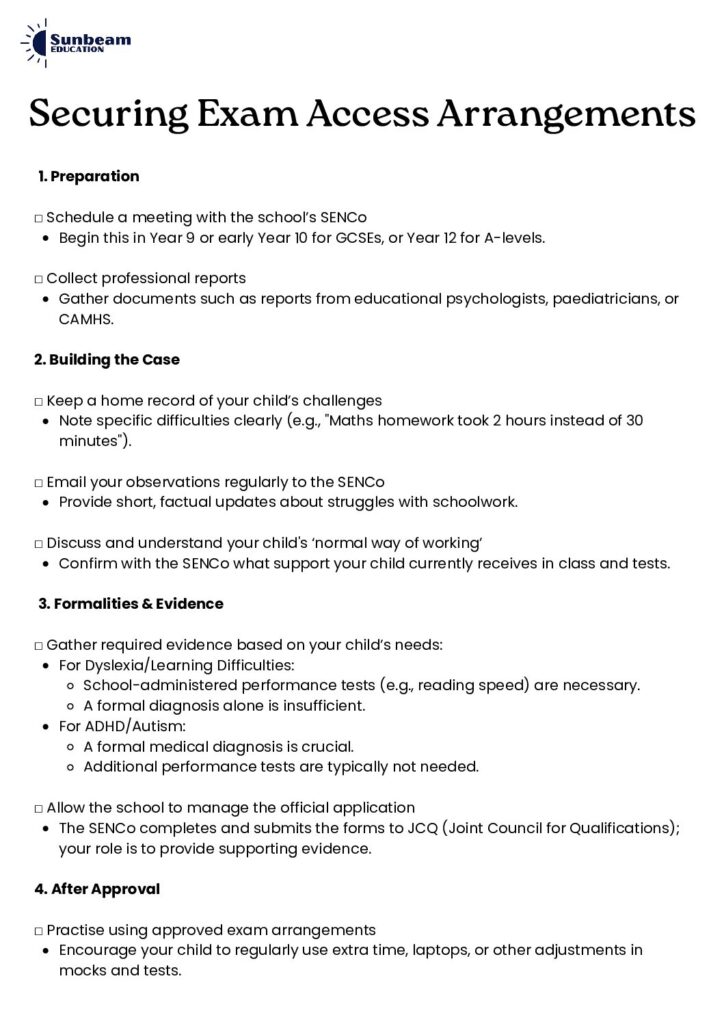In this guide, we'll look at the rules for exam support, known as Access Arrangements, for students with conditions like ADHD, autism, and dyslexia, among other Special Educational Needs. These adjustments are a legal requirement under the Equality Act 2010, which means exam boards must make "reasonable adjustments" to ensure fairness.
What Are Access Arrangements?
Access arrangements are exam adjustments which help students with disabilities, learning difficulties, or long-term medical conditions. The goal is not to make exams easier but rather to provide equal access so every student can demonstrate their true ability. Moreover, adjustments cannot change the skills being tested. For example, a student cannot use a reader during an exam that assesses reading comprehension.
Common examples of access arrangements include:
- 25% Extra time: For students who process information more slowly.
- Separate/smaller room: To reduce anxiety and minimise distractions
- Word processor (laptop): For students with slow or illegible handwriting. Spellcheck and grammar check will be disabled.
- Supervised rest breaks: Allow the student to pause the clock for short breaks.
- A 'prompter': An adult who can use a discreet gesture or phrase to help a distracted student re-focus.
- Reader/computer reader: Reads exam questions aloud.
- Scribe: An adult who writes down the student's dictated answers.
- Coloured Overlays/Paper: Helps with visual stress.
- Reading Pen: Scans and reads individual words aloud.
Two Core Principles
These two core ideas determine the awarding of suitable access arrangements:
1. Normal Way of Working
This is the most important idea. Arrangements can only be approved if they reflect the support your child regularly uses in school. For example, a student cannot be granted a laptop for their final exams if they have always previously written their classwork and mock exams by hand.
Evidence of a 'normal way of working' is crucial. Working regularly with a specialist SEN tutor can help demonstrate a history of need and support outside the classroom.
2. Paint a Picture of Need
Secondly, the school must show a clear and consistent history of need. A single report or diagnosis isn’t enough on its own. Instead, schools must gather and present evidence from teacher records, classwork, parent feedback, and the student’s own reflections.
Why Technology Matters
As a result of updated JCQ guidance, schools have been encouraged to use assistive technology (such as laptops and computer readers) rather than human support (like readers and scribes). This approach aims to help students become more independent and prepare them for future educational or professional pursuits. It's also important to note that computer readers are also the only reading support allowed in exams that test reading comprehension, such as GCSE English Language.
How the Process Works
The School’s SENCo (Special Educational Needs Coordinator) coordinates exam access arrangements.
- As a first step, the SENCo identifies students who require support, gathers evidence, and submits applications to exam boards.
- Schools should start gathering evidence at least a year before exams to demonstrate the student’s “normal way of working.”
- The final deadline for most applications is usually late March of the exam year. Note, the deadline for requesting modified papers (e.g., Braille) is earlier, usually in January.
Who are the JCQ?
The Joint Council for Qualifications (JCQ) represents major UK exam boards, including AQA, Pearson Edexcel, and OCR. They set the national rules that all schools must follow for Access Arrangements.
How Parents Can Help
You’ll find the process much smoother if you stay proactive and keep informed about the school's options throughout the process.
- Talk to the SENCo early. Don't wait until the exam year.
- Share reports from psychologists or medical specialists with the SENCo.
- Keep communication open. Update the school about any educational challenges your child is experiencing.
- Encourage practice once you know what access arrangements your child has in place. Help your child use them during mock exams (and for classwork and homework, if applicable) to build familiarity and confidence.
The Role of Private Assessments
Many parents choose private assessments. However, schools cannot grant arrangements based solely on these reports. That said, private assessments can be very valuable evidence for the SENCo to consider as part of the overall 'picture of need', and can help guide the school's assessment. Always ensure your assessor is a registered HCPC educational psychologist.
How Arrangements Differ By Need
The evidence required depends on your child's specific struggle.
- For individuals with dyslexia and learning difficulties, the focus is on performance, not diagnosis. This means that the school must demonstrate that the student works significantly slower than their peers, typically through formal tests such as reading or writing speed. A dyslexia diagnosis alone isn’t enough to qualify for extra time. Importantly, in subjects where spelling, punctuation, and grammar (SPaG) are marked, students may lose those marks if they use a human scribe. Using a laptop avoids this issue.
- For autism (ASD) and ADHD, the process focuses on both diagnosis and classroom impact, rather than performance tests. Required evidence includes:
- A formal diagnosis - A letter or report from a specialist like a paediatrician, psychiatrist, or CAMHS confirming the diagnosis.
- Supporting school evidence showing how the condition affects learning (e.g., anxiety, sensory overload, poor concentration). This confirms that the requested support matches the student’s usual classroom experience.
If You Disagree with the School's Decision
If you disagree with a school’s decision, discuss it directly with the SENCo. Parents cannot appeal directly to exam boards, as all formal appeals must go through the school.
Key Takeaways for Parents
- The SENCo leads and decides on arrangements.
- Support must reflect your child’s “normal way of working.”
- Schools must show an ongoing “picture of need.”
- Start early. Don't wait until Year 11 or 13.
- Share reports and observations with the school to strengthen the evidence base.
- Private assessments can support applications, but don’t guarantee arrangements.
- Technology-based support is often preferred over human readers and scribes.

Checklist: Securing Exam Access Arrangements
This is a step-by-step plan for parents based on the article above, or use this printable version:
1 - Preparation
Schedule a meeting with the school's SENCo
Ideally, begin this process in Year 9 or at the start of Year 10 for GCSEs, and at the start of Year 12 for A-Levels.
Why: The SENCo is in charge of the entire process. Building a relationship with them from the outset is an important first step.
Gather and share existing professional reports
Collect documents such as reports from educational psychologists, paediatricians, or CAMHS that confirm a diagnosis or describe your needs.
Why: While these reports can’t grant an arrangement, they are important pieces of evidence that the school needs to take into account.
2 - Building the Case
Keep a log of your child's difficulties at home
Record where your child struggles, especially with school. For example, "My child took 2 hours to complete a 30-minute maths worksheet".
Why: This provides evidence of your child's challenges outside the classroom.
Email your observations to the SENCo
Send short emails with your observations. An example might be:
" I wanted to let you know that Emily spent three hours completing her history homework last night, though the teacher advised it would take only one".
Why: This helps the school build the 'picture of need' and demonstrates that the challenges are long-term.
Discuss and understand your child's 'normal way of working'
Ask the SENCo at your school what support your child receives in class and for tests.
Why: Any arrangement for exams has to be based on the support they regularly use in school. You need to know what support they get.
3 - The Formalities
Understand the specific evidence your child needs.
For Dyslexia/Learning Difficulties: As the school will need its own tests to determine performance scores (e.g., reading speed), a diagnosis is not enough on its own.
For ADHD/Autism: As a formal medical diagnosis is the most important piece of evidence, performance tests are not required.
Allow the school to lead the application.
The SENCo will complete the official forms and submit them to the JCQ (the exam boards' organisation).
Why: The system is designed to be school-led. Your role is to provide supporting evidence.
4 - After Approval
Ensure your child practises using their arrangements.
Practice using the extra time, laptop, or other adjustments in all mock exams and internal school tests.
Why: This brings comfort with using the assigned support. You want to know that the support will be genuinely helpful in the final exams.
If You Disagree with a Decision
Book a meeting to discuss your concerns directly with the SENCo. Parents cannot appeal to the exam boards. Therefore, any formal appeal must be made by the school, and resolving the issue with the SENCo is the only path.

Being informed and proactive is the most effective way to secure the support your child needs to succeed in their exams. If you need additional exam support, our tutors understand exam access arrangements and can help students prepare.





